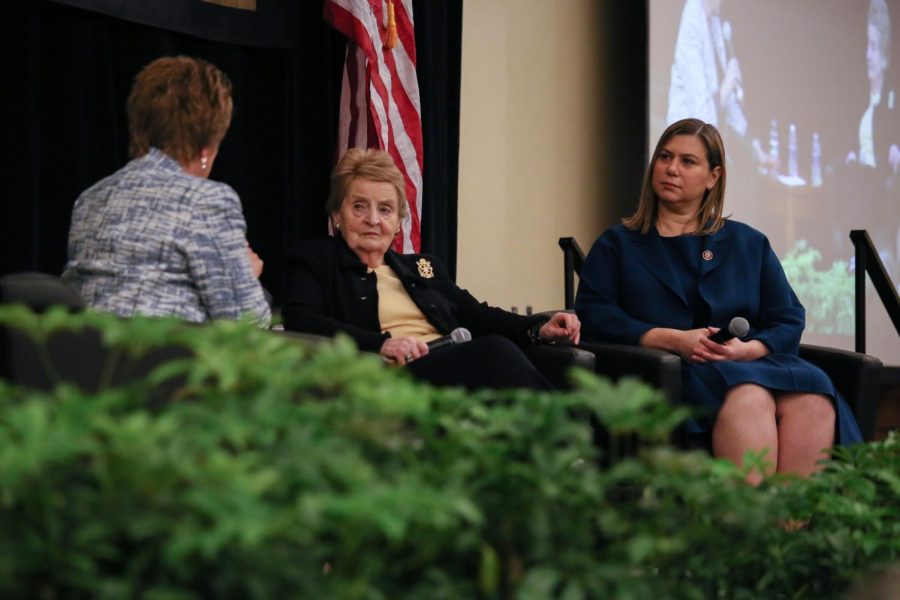Rep. Slotkin and former Secretary of State Albright discuss national security, sexism
Former Secretary of State Madeleine Albright and U.S. Rep. Elissa Slotkin answer audience questions about national security and mentorship in politics.
U.S. Rep. Elissa Slotkin (D-Mich.) and former Secretary of State Madeleine Albright came to Oakland University on Thursday, Feb. 20 to talk about national security, serving the U.S. and mentorship in politics. The congresswoman and former secretary answered audience submitted questions through moderator and OU professor Beth Talbert at the Center for Civic Engagement-sponsored event.
Slotkin and Albright have led lives shaped by their roles in national security. Albright served as the U.S. ambassador to the United Nations (UN) and later as the secretary of state under Bill Clinton’s administration, frequently working with foreign diplomats and attending hearings at the Capitol. Slotkin’s national service career began with a role as a CIA analyst under George W. Bush and served in Barack Obama’s Department of Defense before being elected to the House of Representatives in 2018.
The two diplomats first met at a bipartisan freshman representatives retreat after the 2018 election. Slotkin led the former secretary around the retreat, introducing her to the other representatives.
“I really see her as a mentor and as someone who has done something so many of us aspire to do, which is really play at the absolute top echelons of national security,” Slotkin said of Albright. “She has been a wonderful, wonderful support to me.”
Slotkin and Albright still rub shoulders due to both being Democrats and being involved in U.S. foreign relations, even after Albright moved from government into academia, much to Albright’s dismay.
“I loved being secretary of state,” she said. “I said at the time that I would have to be dragged out by my heels — and I was.”
Not only did Slotkin and Albright relate due to their shared politics and professional backgrounds, but also because they were some of the only women involved in national security at their respective times. The women had to cut through loads of resistance while in Washington.
“There is sort of the standard sexism, especially at The Pentagon,” Slotkin said. “I would be leading a meeting of three and four star generals … I would walk in and [the generals’ aides] would see me, this young female, and say, ‘Oh, just take any of the seats in the back.’”
Slotkin also had to face unconscious, microaggressive sexism, such as when a man she worked with would compliment her with phrases such as “your dad must be so proud.”
“He meant it in the nicest way possible, but the truth is he would never say that to a 38-year-old man,” Slotkin said.
Similarly, Albright’s career was marked by constant resistance on account of her being a woman. Whether it was American diplomats doubting her ability to work with Middle Eastern leaders at the UN or the “anyone but Albright” campaign against her appointment to secretary of state, sexism was constantly underestimating her abilities in the foreign policy arena.
As the event wrapped up, the two were asked how young people could get involved in politics. Slotkin, who is running for reelection, offered encouragement to the students in the Oakland Center.
“I know there is a lot of angst on both sides of the aisle about this election, and lord knows Michigan is going to be ground zero,” Slotkin said. “If you have a lot of extra angst and energy, get involved in a campaign.”
Slotkin also passed on some advice she received before her 2018 House run.
“In the United States of America, fortune favors the bold,” she said. “If you are willing to do something bold and step out … this is a place where you can succeed.”







